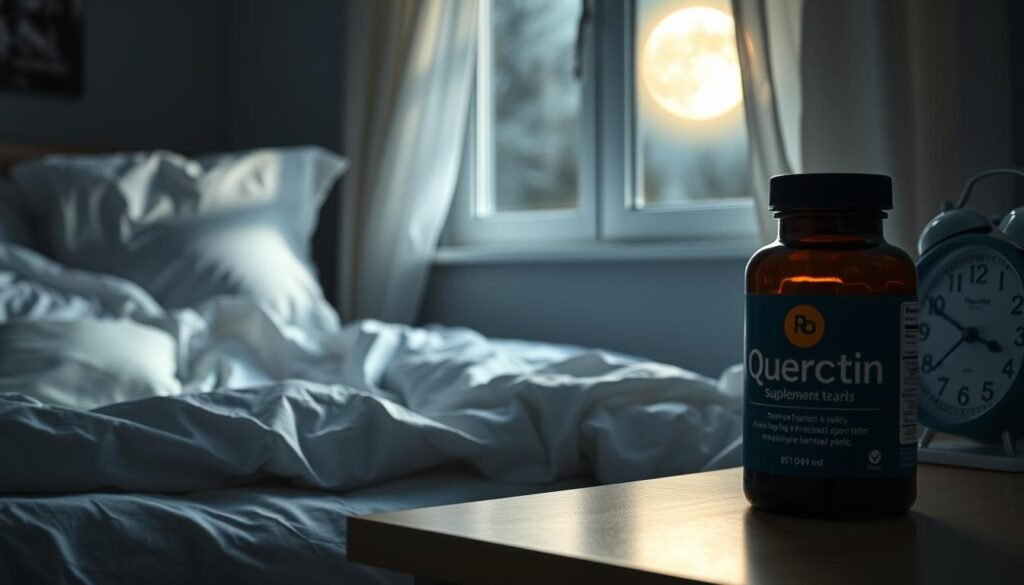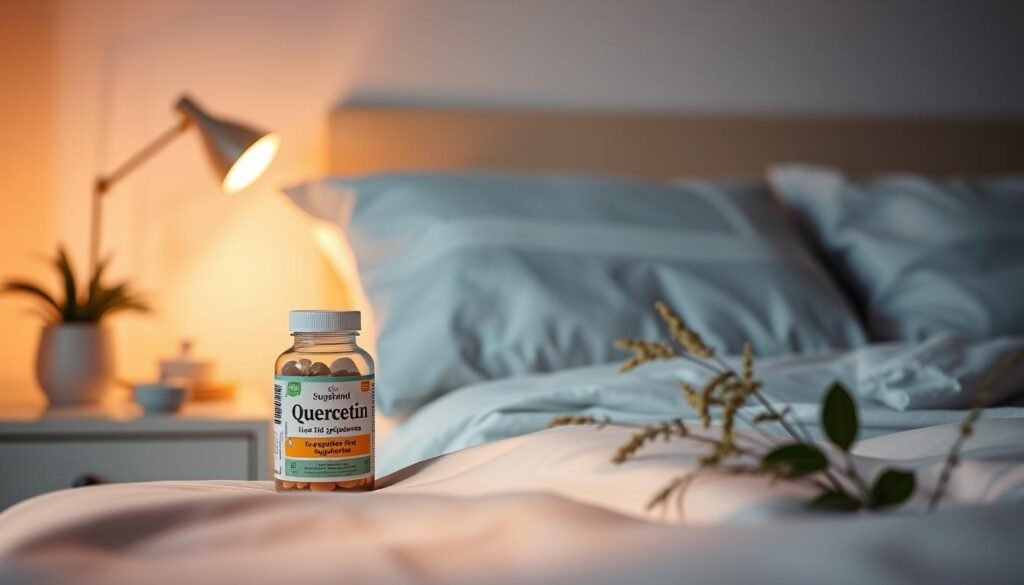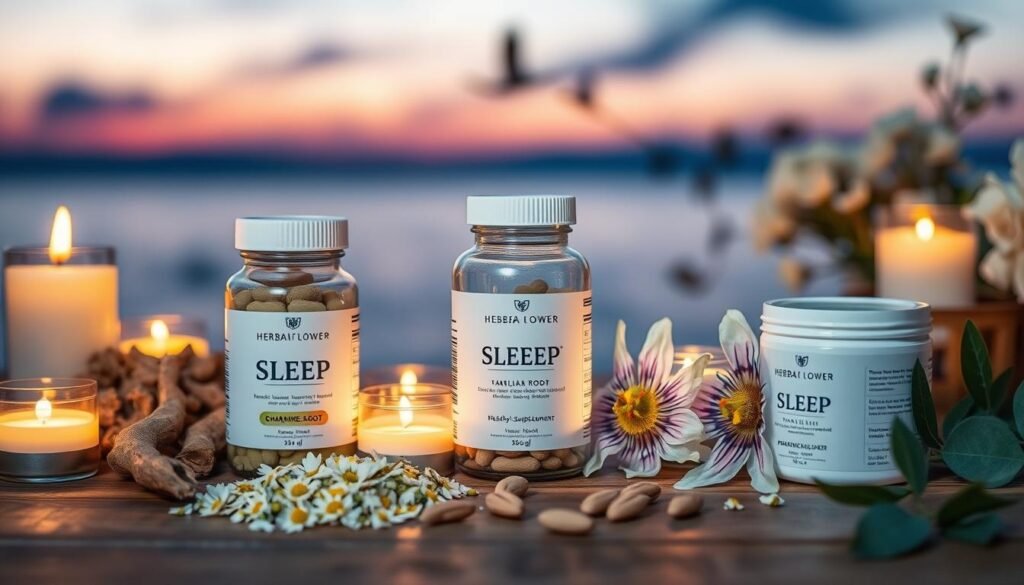Did you know that nearly 30% of adults in the United States struggle with insomnia? Many look to nutritional supplements like quercetin for help. This powerful antioxidant is in many fruits and veggies. It’s important to know if quercetin can cause insomnia. Its influence on sleep can change how we prepare for bed.
Let’s dive into the science of quercetin, its benefits, and its effects on sleep. Are you curious about how quercetin might affect your sleep, for better or worse? Join us to learn more!
Key Takeaways
- Quercetin is a potent antioxidant found in various fruits and vegetables.
- Understanding quercetin sleep effects is crucial for those struggling with insomnia.
- Research highlights both the benefits and potential drawbacks of quercetin on sleep quality.
- Safe usage of quercetin supplements is considered to be around 1,000 mg per day.
- Consultation with healthcare providers is recommended before starting quercetin supplementation.
Understanding Quercetin
Quercetin is a flavonoid found in many plants. It’s known for its strong antioxidant properties. Researchers are looking into its benefits for sleep and immune function.
What is Quercetin?
Quercetin gives color to fruits and vegetables. It fights free radicals, reducing oxidative stress. This boosts the immune system, making quercetin a top choice for healthier diets.
Sources of Quercetin
Many foods contain quercetin, offering a tasty way to better health. Examples include:
- Citrus fruits
- Apples
- Onions
- Parsley
- Green and black tea
- Red wine
Including these in daily meals can increase quercetin intake and its health advantages.
Health Benefits of Quercetin
Quercetin’s benefits go beyond antioxidants. Studies show it can:
- Reduce allergy symptoms like runny nose and watery eyes
- Lower LDL cholesterol, more so with alcohol-free red wine extract
- Lower blood pressure in high blood pressure patients
- Stop some cancer cells from growing
- Improve symptoms of interstitial cystitis and rheumatoid arthritis
It might even help with prostate issues in men. Exploring quercetin’s effects on sleep involves diving into neurotransmitter research, like in this study on sleep cycles.
Mechanisms of Action
Quercetin’s actions help improve our health. Its antioxidant power shields cells from harm caused by stress. This stress comes from free radicals that can hurt cellular structures, leading to health problems. Quercetin fights off these dangers, keeping cells healthy.
Antioxidant Properties
Quercetin is known for its antioxidant abilities. It stops the harmful effects of oxidation on fats and reduces signs of inflammation. These issues are connected to chronic diseases and sleep problems. By boosting our body’s defenses, quercetin supports our health and balance.
Inflammation and the Immune System
Quercetin helps manage inflammation. It targets substances in the body that cause inflammation, helping reduce its effects. A healthy immune system depends on good sleep, and there’s a clear link between sleep and immunity. For those having trouble sleeping, quercetin might help. Sleep loss and inflammation are closely related as shown in studies on sleep deprivation.
Quercetin and Sleep Quality
Studies show quercetin improves sleep quality by working on GABA receptors and the sleep-wake cycle. It’s a natural substance found in many foods, showing great promise in boosting sleep health.
The Role of GABA Receptors
GABA receptors help the brain relax and lessen anxiety. Quercetin activates these receptors, leading to better sleep. It enhances restful sleep and decreases night disturbances. Quercetin shows promise in helping people achieve better sleep.
Effects on Sleep-Wake Cycle
Quercetin positively affects the sleep-wake cycle by boosting melatonin. This hormone controls our sleep patterns. It may improve sleep quality and lessen nighttime awakenings, leading to more restful nights. Quercetin’s anti-inflammatory properties also play a role in healthy sleep regulation. It offers a natural way to enhance sleep quality.
Can Quercetin Cause Insomnia
The link between quercetin and sleep is not straightforward. Quercetin is a well-known flavonoid that’s been widely studied. While some research points to possible sleep benefits, others suggest it might disrupt sleep, especially in large amounts.
Research Findings
Research offers mixed views on quercetin’s effects on sleep. One study showed that people taking quercetin felt the same as those who took a placebo. There were no big changes in their energy, tiredness, or sleep quality. This makes us wonder if quercetin really causes insomnia, or if it’s more about how much you take and your body’s reaction to it.
Studies on Quercetin and Sleep Disruption
Many studies look at how quercetin might affect sleep disorders. A review in 2018 talked about its benefits for health, yet questions remain. Researchers are still checking if too much quercetin might disturb some people’s sleep. Even though quercetin is found in common foods, its impact on sleep is still being closely watched. This is especially true because many people today struggle with anxiety and insomnia.

| Study Type | Findings | Dosage Considerations |
|---|---|---|
| Randomized, Double-Blind | No significant difference in sleep quality | Normal dietary intake vs. high doses |
| Quercetin Sleep Disruption Studies | Potential sleep disturbances noted in high doses | Individual sensitivity may vary |
Quercetin’s Impact on Sleep Patterns
Many studies have looked into how quercetin impacts sleep patterns, focusing on its ability to improve REM sleep. As a powerful antioxidant, quercetin fights oxidative stress. This stress can harm sleep quality. Animal studies have shown quercetin can improve sleep cycles, leading to more REM sleep.
Effects on REM Sleep
The effects of quercetin on REM sleep are notable for their potential to enhance sleep. Research shows that quercetin can lengthen REM sleep. This leads to a deeper, more restful sleep. Such changes can help those with sleep disorders.
Potential to Improve Sleep Disorders
Quercetin’s antioxidant qualities make it a hopeful option for treating sleep disorders. Some studies found that quercetin improves sleep for people taking supplements. It might be a natural way to handle insomnia, offering an alternative to usual treatments.
| Study Type | Participants | Observations | Results |
|---|---|---|---|
| Animal Study | Rodents | Oxidative Stress Reduction | Increased REM sleep duration |
| Clinical Trial | Human Subjects | Quality of Sleep Assessment | Improved sleep quality reported |
| Meta-Analysis | Multiple Studies | Quercetin Supplementation | Significant enhancements in sleep metrics |
Quercetin and Sleep Disorders
Looking into quercetin and its link to sleep disorders reveals potential benefits worth considering. This research highlights quercetin’s promise for sleep issues, with a focus on its ability to reduce inflammation and impact neurotransmitter function.
Relationship with Sleep Apnea
Recent studies have focused on how quercetin might affect sleep apnea. It seems quercetin could help reduce inflammation linked to this condition. Such inflammation often leads to airway blockages during sleep, making symptoms worse.
Adding quercetin to one’s diet may lower inflammatory reactions. This could lead to better sleep quality.
Effects on Insomnia Symptoms
Quercetin could also address insomnia by influencing the sleep-wake cycle. It appears to activate GABA receptors, which may help people relax and fall asleep faster. Those facing insomnia might find quercetin useful, as it could decrease oxidative stress that interrupts sleep.
For more insights on quercetin’s role in managing sleep disorders, check out this review study.

Quercetin Supplementation
Quercetin supplements have become more popular because they offer many health benefits. Quercetin is a strong flavonoid. It’s celebrated for its ability to fight oxidation and reduce inflammation. For those who use it, understanding the right amount to take and safety tips is key to getting its full benefits.
Dosages and Safety Considerations
Experts say taking up to 1000 mg of quercetin daily is usually safe, based on studies. But, people thinking about trying quercetin should be careful, especially if they have health issues or take other medicines. It’s wise to talk to a healthcare provider for advice before starting any new supplement.
Best Practices for Use
To absorb quercetin better, it’s a good idea to take it with zinc. Research shows zinc can help the body use quercetin more efficiently. A product named QuerciSorb® Immophore SR combines quercetin with zinc, vitamin D, and vitamin C. This mix makes taking supplements easier and helps improve your health. To see the best effects, staying hydrated, considering how foods affect the supplement, and following the suggested amounts is crucial.
Quercetin Insomnia Side Effects
Quercetin is a well-liked natural compound with many health benefits. It’s mostly safe, but some have experienced quercetin insomnia side effects. This is particularly true when taken in large doses. People adding quercetin to their diet might see mild headaches or stomach issues.
Potential Negative Reactions
The negative effects of quercetin are usually minor. Still, it’s important to pay attention to how you feel. There hasn’t been much research on the long-term effects of quercetin. By keeping track of how you feel, you can better understand what works for you.
Long-Term Use Concerns
There are concerns about using quercetin over a long time. This is due to a lack of long-term study data. It’s a good idea to talk to a doctor if you plan to use it regularly. How quercetin affects you can depend on many things, like how much you take and your health. To learn more about getting quercetin from fruits and veggies, check out this page.
Combining Quercetin with Other Nutrients
Mixing various nutrients can greatly improve our health. This is especially true when we add quercetin to the mix. Studies show that combining quercetin with things like zinc boosts its effects. This mix not only makes quercetin work better but may also help you sleep better.
Quercetin and Zinc Interaction
The way quercetin and zinc work together is impressive. Zinc helps quercetin get absorbed better, making it more effective. This partnership increases the positive effects of both, helping support the immune system and potentially making sleep better.
Impact on Sleep Quality
Adding quercetin to your diet with zinc can really help with sleep. These nutrients work together to help regulate sleep better, possibly fixing sleep issues. People wanting to improve their sleep might find this combination helpful in their supplement choices.
Alternatives to Quercetin for Better Sleep
People looking for better sleep might consider different natural methods. Using herbal supplements and changing your diet can be great alternatives to quercetin. Let’s explore popular herbs and dietary changes that help with sleep.
Herbal Supplements
Many herbs show great results in making you relax and sleep better. For example, Valerian root is famous for its soothing effects. It helps people with insomnia for a long time. Then, there’s Chamomile tea, which calms your nerves and helps you sleep.
Kava-kava is another powerful herb. It’s known for reducing stress and restlessness. The German Commission E even recognizes it for stress relief. Studies show it can lessen anxiety, helping you find better sleep. Also, supplements with polyphenols from plants are good. They help you fall asleep faster and increase the time you sleep, studies with many people reveal.
Dietary Changes for Sleep Improvement
Eating foods full of nutrients can really boost your sleep health. Foods with magnesium, vitamin D, and omega-3s are key. Magnesium-rich foods like leafy greens, nuts, and seeds help control sleep. Also, fatty fish like salmon, with lots of omega-3s, lead to improved sleep quality.
Tackling sleep problems can be easier with these quercetin alternatives. They offer a complete approach for those wanting to sleep better.

| Herbal Supplement | Key Benefits |
|---|---|
| Valerian Root | Calming effects, aids in falling asleep |
| Chamomile | Promotes relaxation, supports nervous system health |
| Kava-Kava | Reduces anxiety, improves sleep patterns |
| Polyphenol Supplements | Decreases sleep onset latency, increases total sleep time |
Quercetin Nighttime Use
The use of quercetin at night is all about timing. When you take it can change how well you sleep. People react differently to its timing, affecting their sleep.
Best Time to Take Quercetin
Figuring out when to take quercetin can make a big difference. Taking it in the evening helps many relax and sleep better. Yet, some find taking it earlier avoids nighttime issues. It’s key to see what works best for you.
Effects on Evening Sleep
Studies show quercetin may improve sleep, especially non-REM sleep. Though sleep patterns vary, adjusting when you take it helps. Watching how you react helps you get the best sleep with quercetin.
| Time of Day | Effect on Sleep | Recommended Dosage |
|---|---|---|
| Morning | May aid in energy and alertness | 500 mg |
| Evening | Enhances relaxation and promotes sleep onset | 1000 mg |
| Before Bed | Potentially disrupts sleep for some users | Depending on individual response |
Conclusion
Studying if quercetin can cause insomnia shows a complex link to sleep quality. For many, quercetin improves sleep. Yet, how it affects people can vary. It matters since research often focuses on men, making personal health choices important.
Quercetin appears to help with sleep and well-being. It can lower anxiety in people with sleep issues. This shows how mood and sleep are connected.
Quercetin might help with sleep, but we need more studies. Everyone should think about their health needs before trying it. This careful choice can lead to better sleep and life quality.